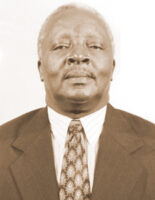
Joseph Kimeu Ngutu was a police officer-turned-politician who had difficulties fitting in the shoes of mercurial politician and freedom fighter, Paul Joseph Ngei.
Ngutu was the beneficiary of Ngei’s fall from power when he was finally forced to resign from his Cabinet post and relinquish his Kangundo parliamentary seat in 1991 after being declared bankrupt by the High Court of Kenya.
As soon as Ngei was declared bankrupt, Ngutu, who had been groomed and primed for the position, declared his interest in contesting the seat once it was declared vacant. He had retired as Deputy Commissioner of Police in charge of the Nyeri-based Kiganjo Police Training College. He contested the seat in the subsequent by-election and won, becoming the second occupant of the seat since independence.
He was appointed Minister for Labour, a position he held for about a year and a half until the 1992 multiparty elections in which he lost the seat to a political greenhorn, Joseph Wambua Mulusya, who ran on a Democratic Party (DP) ticket. The party was led by Mwai Kibaki.
Five years later, Ngutu made a dramatic comeback. In the 1997 elections, he, under the sponsorship of strong KANU party forces led by the Machakos District Chairman and Moi’s point man, Joseph Mulu Mutisya, put up a spirited fight against the Opposition candidate and managed to win back the Kangundo seat.
Ngutu once again became Minister for Labour where he stayed for the next five years until the 2002 General Election in which he, along with many other KANU politicians including Moi, lost to a combined Opposition that coalesced around the National Rainbow Coalition (NARC) led by Kibaki.
Born in Kawethei, Kangundo District in what is now Machakos County, in 1941, Ngutu went to the local Kawethei District Education Board (D.E.B.) School for his primary and secondary education. As a lad coming from humble beginnings, Kimeu did what many African boys did: looked after his father’s cattle and helped his parents with household chores and work on the shamba (farm).
From an early age, Ngutu had a strong desire to serve in the disciplined and uniformed forces. He therefore took advantage of a recruitment exercise in Kangundo and showed up for conscription. He was recruited in 1966 while in his mid-twenties and went to Kiganjo Police Training College in Nyeri.
He worked at many stations across the country and rose through the ranks to the position of Deputy Commissioner of Police in charge of Operations. His rise is attributed to his high sense of discipline in carrying out his duties and his dealings with various cadres of staff in the police force. This is said to have endeared him to his superiors in the police force as well as politicians.
One of these politicians was Mutisya, who identified him as a potential ally in the game of politics as soon as he retired from the police force in 1990. Mutisya saw Ngutu as the no-nonsense man who could successfully take Ngei head-on and replace him as MP for Kangundo.
According to those in the know, Mutisya, like Moi, was never comfortable with “arrogant and uncooperative Paul Ngei” as MP for Kangundo. Indeed, according to insiders Moi only kept Ngei in the Cabinet because of the large following he commanded in Ukambani and the undisputed role he played in the struggle for Kenya’s independence.
When an opportunity presented itself through the courts, Moi grabbed it and Ngei was subsequently replaced by Ngutu. With the powerful ruling party KANU behind him, Ngutu, a political neophyte, led a spirited campaign and eventually won the seat in the 1990 by-elections beating such perennial contestants as Henry Muli.
Since the holder of the Kangundo seat was always a Cabinet minister, in usual Moi style Ngutu was appointed to the Cabinet as Minister for Labour.
But if he did not cut a high profile as a minister, Ngutu was very active as the Kangundo MP, holding many fundraisers for development projects. Some of the projects credited to Ngutu included the construction of health centres, Kawethei Secondary School and coffee processing factories. He also encouraged farmers in agriculturally potential areas to start coffee plantations.
He would not enjoy the position of minister for long.
Two years after he was elected MP for Kangundo to replace Ngei, he was defeated during the sweeping tide of multipartism when youthful Opposition politician, Mulusya of Kibaki’s DP, won the seat in 1992.
Mulusya’s five-year stint as Kangundo MP was, however, characterised more by KANU bashing and other political theatrics than any meaningful development efforts. Mulusya was a rather noisy MP, both in and out of Parliament. But as he made numerous contributions in the House and held political rallies in Kangundo, Ngutu was quietly consolidating his grassroots support in the vast constituency. As a consequence, KANU reclaimed the seat in the next elections held in 1997. Ngutu was re-elected but was not appointed to any ministerial position
Four years later, on 11 June 2001, in one of his signature lunchtime Cabinet reshuffles, Moi re-appointed Ngutu to head the Ministry of Labour. The move was specially meant to accommodate Raila Odinga in the Cabinet. Odinga had been re-elected MP for Kibera on a National Development Party ticket after ditching the Opposition and forging alliances with KANU.
Ngutu worked as minister for just about a year before the 2002 General Election when he lost his seat to Moffat Maitha, who contested via the little-known Sisi Kwa Sisi party.
